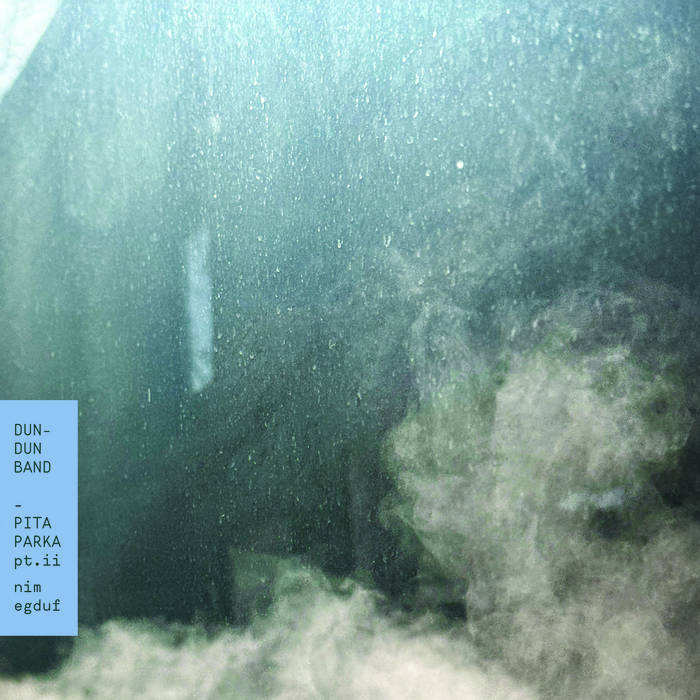As his Bandcamp page wittily affirms, Craig Dunsmuir has been “riffing repetitively since 1992”. The Toronto-based guitarist’s solo works (as Max Gross, Kanada 70, and Guitarkestra) and genre-bending collaborations with Polmo Polpo’s Sandro Perri (Glissandro 70, Off World’s 2) have always been drawn to intricate, shuffling guitar polyrhythms – the riffs’ countless loops equally likely to branch off into Afrobeat, dub, dance music and noisier intangibles. The same method drives Dun-Dun Band, a ten-piece group comprising Toronto creative music scene mainstays that perhaps hold the ultimate expression of Dunsmuir’s jaunty side, all effortless melodicism and hypnotising rhythmic drive.
Pita Parka, Pt. II: Nim Egduf is an album that enchants and transports. Each of its blissed-out segments appears like a portal to some cosy, safe place. Meanwhile, reality slips away. By the time we hear the very first notes of ‘No. 3 (No Chess Today)’, the bags are already packed and we’re tripping, the tropical salt and sun of guitar meows tumbling across a shifting tapestry of shakers, congas, and breezy saxophone harmonies. Whereas many of their minimalist jazz cousins would be happy to keep chilling in this comfortable, ambient-coded spot for the duration of the eleven-minute track, moving back-and-forth in minute gradations while staying in place, Dun-Dun Band have a proper spring in their step. Right in the middle of all this Balearic bliss, they drop an atmospheric pause. The lull feels like violence, an abrupt wake-up call to end a sweet dream. But as the group come back in full force, the payoff is immense, recalling the delirious free jazz skronk of Peter Brötzmann’s Chicago Tentet.
While Dunsmuir’s single-line guitar phrases can’t escape citing gnawa’s sintir articulations, the music is open-minded, borrowing from various traditions from across the globe with care and sophistication, never even coming close to referencing infinitely rehashed “world music” banalities. The contributions of Jay Anderson (Roland Handsonic), Josh Cole (electric bass), Ted Crosby (bass clarinet and tenor saxophone), Colin Fisher (tenor saxophone), Blake Howard (congas and raindrums), Kurt Newman (electric guitar), Karen Ng (alto saxophone and clarinet), Mike Smith (Rhodes 88, Hammond A105, and keyboards), and Brodie West (alto saxophone, clarinet) are key in maintaining this poise, as each member of the ensemble embeds a bit of themselves into the shared fabric, free to alter the course of the collective roll or splash colour whenever things threaten to become drab.
The second piece ‘Drizzly’ thus strolls in with a grumbling Hammond organ riff in one hand and a guitar’s wah-wahing jingle in the other, then spirals into an intimate dance, percussive patterns pressed tightly against each other, suave woodwinds puffing out cloudy shapes. It’s enchanting at first, and almost exuberant later. Meanwhile, ‘Long Winter’ combines the moods of the first two cuts. Long clarinet and saxophone tones lead the way, breaking off into tangents then rejoining the collective in a lovely Ethio-jazz groove.
For such immersive music, Dun-Dun Band’s ideas often appear intent on not letting the listener’s attention drift. Contemplative, almost meditative passages are never left in place; instead, they are continuously transfigured. And just when you think you’re ready to float away, the energy of ground bass pulses, brass soaring in the highest registers, and softly groaning guitar riffs anchors you back in the moment. In such a carefully arranged flow, the album’s shortest track, ‘Styrofoam (Kaji)’, feels almost like a purpose-built closer. It’s a duskier, muted affair. The mind is ethereal, lost in some psychedelic dimension, while the body scuttles around among desert rock dust devils. This is one for the heads – both present and future.


